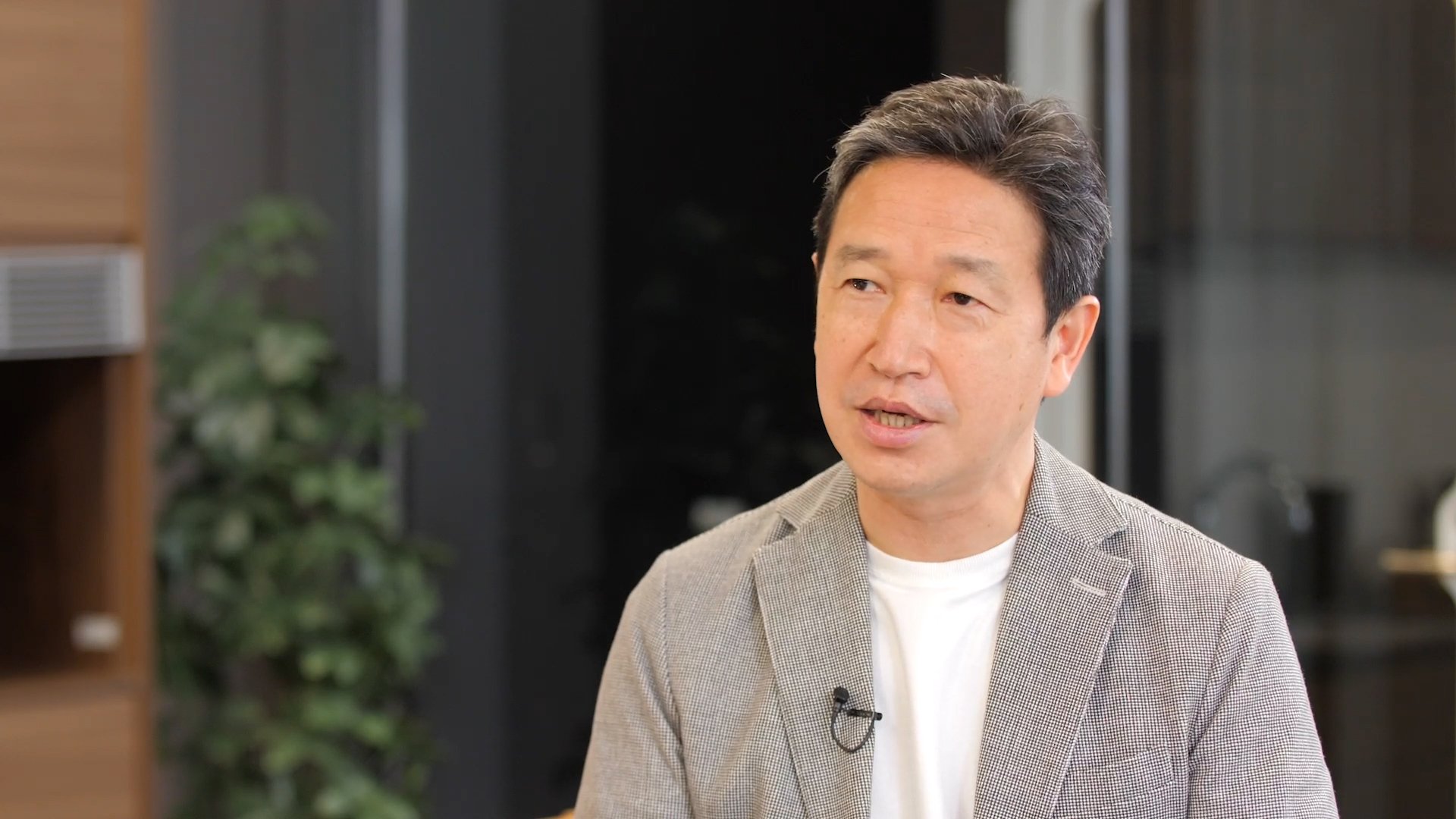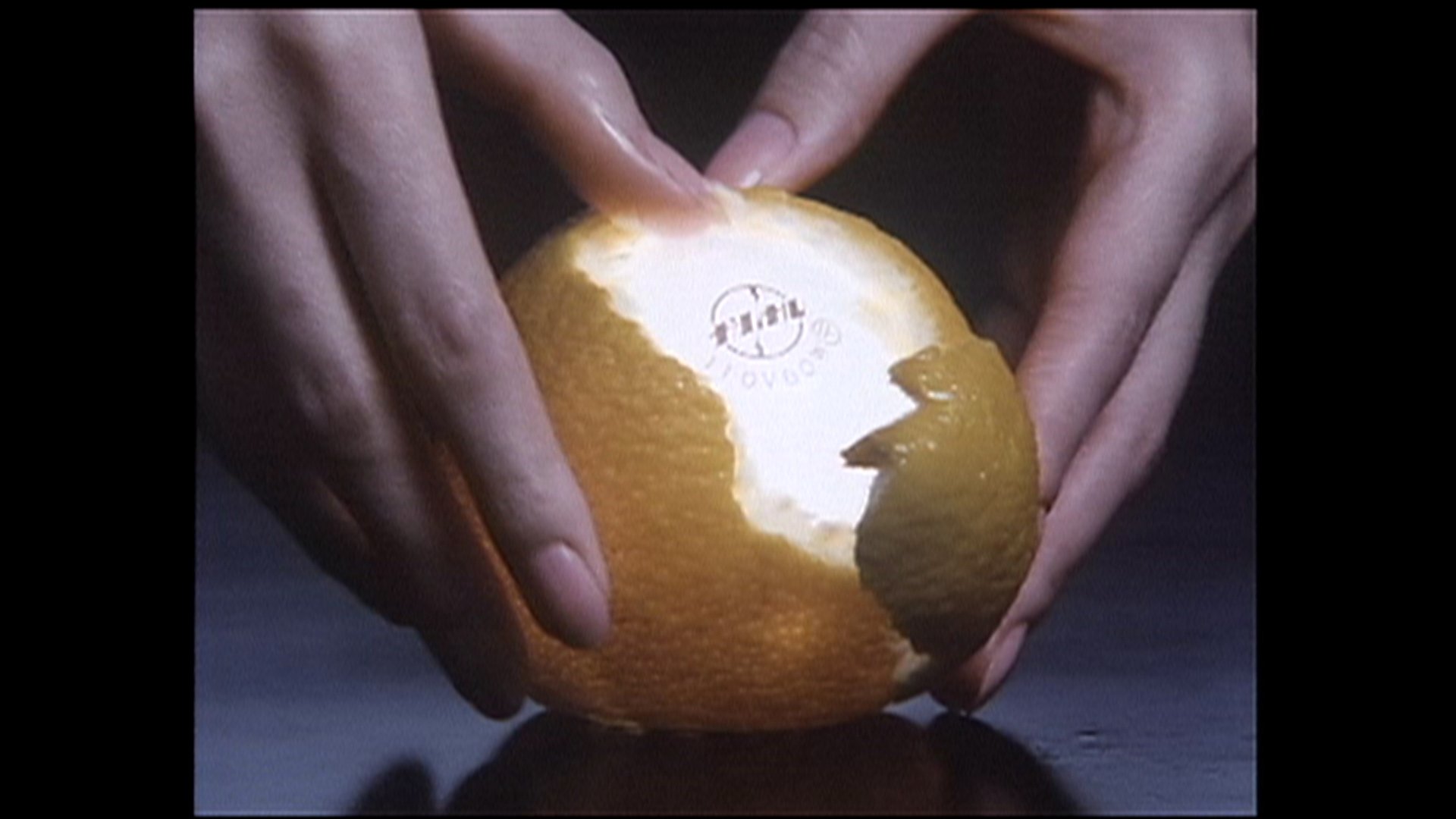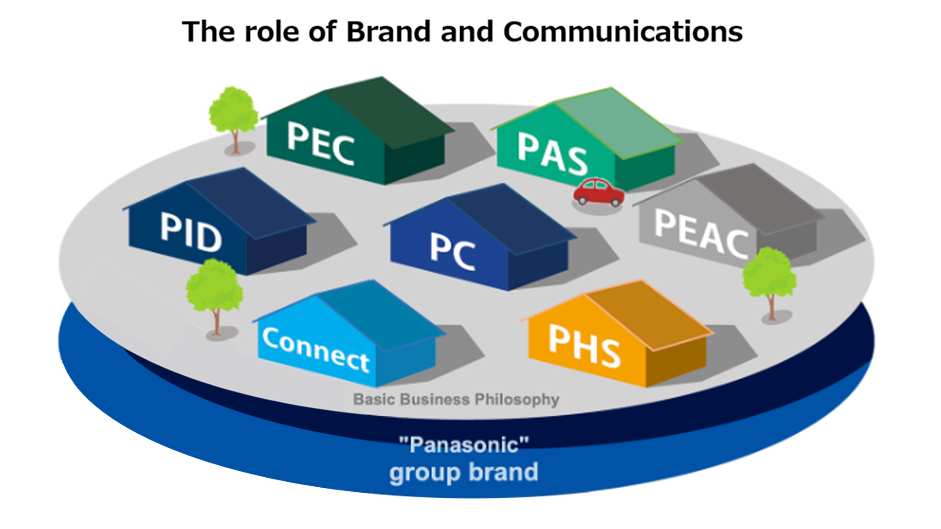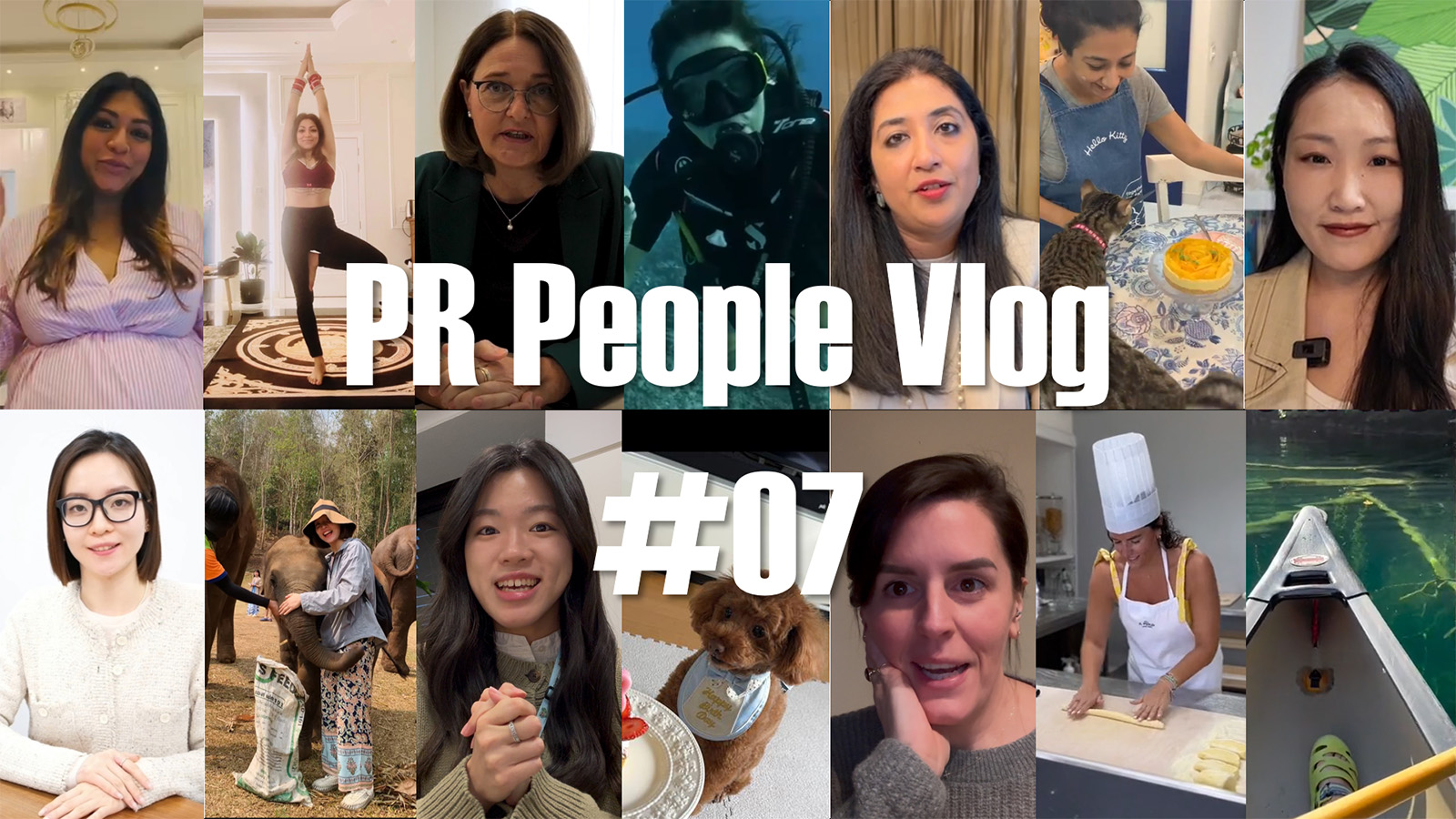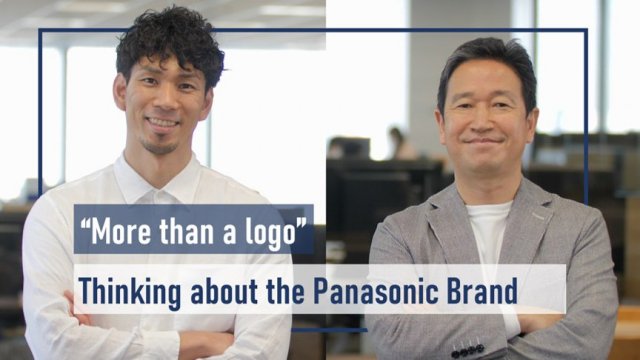
In this interview, Tatsuya Fukuzawa, a former national volleyball player of Japan and a member of team Panasonic Panthers, spoke to Yoshihiro Morii, Executive Officer in charge of Brand and Communication Strategy at Panasonic Holdings Company, about the Group's brand strategy under the new operating company system launched in April 2022. Specifically, what is the current status of the Panasonic brand and what is its future role?
Only 53% among those in 20s recognize the Panasonic brand in Japan
Fukuzawa: I carried the Panasonic brand on my back as an athlete until I retired from the Panasonic Panthers last year so I often ask the children at my volleyball classes whether they know Panasonic. Sometimes only a few of them do, and I definitely feel that there are fewer opportunities for children and young adults to come into contact with and learn about Panasonic compared to before. How do you think the Panasonic brand is doing?
Morii: That is exactly right. According to our survey, the recognition rate of the Panasonic brand among people in their 20s is now 53% in Japan. This shocked me as well. When I was a child, probably everyone in Japan knew about National and Matsushita Electric (former company names of Panasonic). Unfortunately, that has now dropped to around half.
It is important to strengthen the brand among young people because Panasonic's products, both for consumers (B-to-C) and for other businesses (B-to-B), can be used over one's lifetime.
People in their 20's may soon have families and become the main purchasers. Many are also making major decisions in business at a relatively young age. We call the brands that come to a consumer's mind when they are making a purchase decision or an investment "An Evoked Set" and the question is whether Panasonic can become the chosen brand. We need to take action now to safeguard the Panasonic brand for the future.
Fukuzawa: It sounds like it is crucial to have a strong brand strategy right now. When considering a brand, I personally think it is important to first look at the company objectively. You have built a career working with companies in a wide variety of industries especially in the area of branding - what was your impression of Panasonic as a brand?
Morii: When I was in high school, there was a TV commercial by National called "Light Menu." A light bulb was hidden inside a piece of fruit, and it appeared when you peeled off the skin. It was unusual. I thought it was amazing and it left a very strong impression on me. The National brand shone brightly during my childhood in the early 1980s along with its business performance as the company achieved its highest operating profit in 1984. We must be competitive now, not only in business but also in brand, to surpass our previous achievements.
Fukuzawa: In your current position, what do you think are the current challenges?
Morii: The relationship between companies and customers is undergoing a major change triggered by a numbers of factors. These include the emergence of tech-based services such as Google, Apple, Meta and Amazon, increase in personalization triggered by the rapid uptake of digitalization, such as the use of big data and AI, and recent changes in social values seen in the areas of SDGs, ESG and human rights.
In the past, brand strategy tended to focus on "corporate identity," or how to convey the uniqueness and characteristics of a company, but now it must properly reflect the company's relationship with society and customers. Has the Panasonic brand been able to respond to this trend? I believe there are still many challenges we need to address. Rather than just focusing on how to tell the story of our company, we need to carefully consider what is meaningful to society, humankind, and the Earth while conducting our activities.
Branding and Communications play a major role in disseminating the Basic Business Philosophy
Fukuzawa: Last fall, the Panasonic Group updated its Basic Business Philosophy. I personally feel that our Basic Business Philosophy is our great strength.
Morii: There are many ways to increase competitiveness in all parts of the value chain, including development, manufacturing, and sales, but it is most important to realize the purpose of the company. This is described in our "management essentials", which state that our purpose is to realize "an ideal society with affluence both in matter and mind."
The Basic Business Philosophy is our guide to achieving this but it is long so in order to populate this among our colleagues, we have created a Basic Business Philosophy Handbook for employees. This handbook is designed for easy understanding using illustrations and other materials and has been used by the Group's management to communicate the revised Basic Business Philosophy but I believe that it is also the mission of Brand Communication to disseminate it.
Fukuzawa: Why is the Basic Business Philosophy necessary now? Will it enable us, as Panasonic is such a large company, to move forward in the same direction?
Morii: In the world of sports such as volleyball, you cannot win a match without good teamwork in addition to individual strengths. I think it is the same thing. I believe that if we can properly restore our common values once again, the company will surely become stronger, and the brand will shine.
Fukuzawa: The Basic Business Philosophy also mentions that "competitiveness = being chosen by customers." What role does the brand play in being "chosen" by customers?
Morii: To be "chosen" means to be unrivaled in quality, cost, and service and the operating company plays the main role in making this happen.
As for brand communications, I often compare this to land and houses. Each operating company builds an attractive house on the land. Each business has a different environment and situation, so the building of the house must be done by each business. However, I believe the holding company should provide the good land that serves as the foundation. This "land" is the Basic Business Philosophy itself.
Through communicating the Basic Business Philosophy, we can explain the purpose of Panasonic. This is expressed simply in our brand slogan, "Live Your Best" and the brand communication's role is to convey these words to the world.
Fukuzawa: Of course it is important for our employees to fully understand our Basic Business Philosophy, but at the same time, we also want our customers to understand our purpose and what kind of company Panasonic is?
Morii: That's right. People often ask me, "What kind of company is Panasonic?" Our Group has many businesses, and in the past, we have tried to convey a message that is the greatest common denominator of all of them. But this is very difficult. We still need to show why we exist and what we can contribute to our customers and society.
When we conducted research to find out the kind of values that people pursue around the world, we found many different ways of thinking in different countries and regions but there was one common value: happiness. And it was not just instantaneous happiness such as "I bought a good product" or "I ate a delicious meal," but rather the realization of lasting happiness such as peace, spiritual fulfillment, and stability in life, that allows people to live their best.
Our founder, Konosuke Matsushita, said, "Happiness is stable," and that is exactly what he meant. This is the common value that we should offer as a group, and it is this message we need to convey to society in order to be chosen by our customers.
Panasonic GREEN IMPACT is a practice to realize happiness
Fukuzawa: Now thinking from a different perspective, what do you think about confronting the world's most pressing global environmental issues?
Morii: In order to provide sustainable happiness, we must properly face our corporate responsibilities. When we make things, we inevitably emit CO2. If our ultimate goal is to realize happiness, we must fulfill our responsibility to reduce CO2 emissions in the future. This is what we are aiming to achieve with our initiative, Panasonic GREEN IMPACT.
Fukuzawa: Young people probably understandably feel insecure about their future. That's where Panasonic GREEN IMPACT can show that Panasonic is moving toward this goal.
Morii: The phrase "Panasonic GREEN IMPACT" also has a deep meaning. Not so long ago, it was corporate responsibility to express a vision, but now, on a global scale, companies are required to actually set out targets and take action to reduce emissions, and whether or not they are truly giving back to society.
The word "IMPACT" includes the word "ACT." This is not only a vision, but also a commitment that we are going to put it into practice.
The Brand as a Bond
Fukuzawa: I now understand very clearly that a brand is not just a logo or a mark, but is a symbol of our activities.
Morii: I believe that a brand is a "bond". It is not only a bond between a company and its end-user customers and business partners, but also a bond that connects the entire group, including operating companies. What should we do to enhance our business competitiveness? How will the results benefit society? At Brand Communications, we want to connect every employee with these ideas and work on what it means to be happy and a force for good.
In this sense, we believe that in addition to business activities that directly benefit society, brand and communication strategies are also important management strategies. We want to protect and brighten the Panasonic brand to serve as a bond between the Panasonic Group and our customers, rather than as a mere symbol or means of advertising or marketing. That is how I see it.
Yoshihiro Morii is Executive Officer in charge of Brand and Communication Strategy at Panasonic Holdings Corporation. For around 25 years, he built his career at Dentsu, one of Japan's largest advertising companies, and since then held executive positions at Akindo Sushiro, Peach Aviation, and PwC Consulting before joining Panasonic Corporation in February 2020 as Associate Director of the Groupwide Brand Communication Division. In October of the same year, he became Director of the Brand Strategy Division of Panasonic Corporation, and in April 2021, he became an Executive Officer of Panasonic Corporation. He is also a visiting professor at the Graduate School of Business Design.
Tatsuya Fukuzawa is now a contributing member of the Panasonic Operational Excellence Corporation at the Corporate PR Center.
Formerly a member of Japan's national volleyball team, he competed in the 2008 Beijing Olympics and joined the Panasonic Panthers in 2009, helping the team win three national titles. He was also an active player overseas, playing in Brazil in 2015-2016 and participating in the French league in 2019-2021. He retired as a competitive volleyball player in August 2021.
# # #
Disclaimer:
We would like to note that Panasonic Newsroom is not a place to address personal Customer Service issues. Even though this is not the forum, Panasonic is always eager to resolve your concerns. Our local customer services contacts can be found at Global Support or you can see our list of Social Media Accounts to find the right channel for your queries and concerns.

